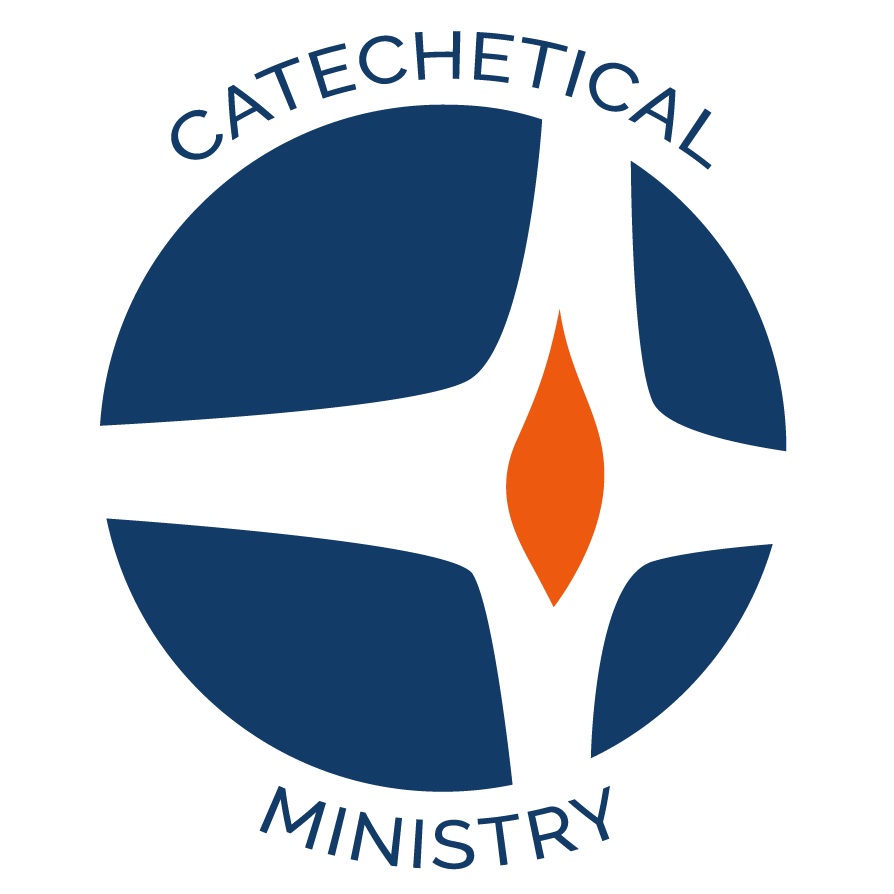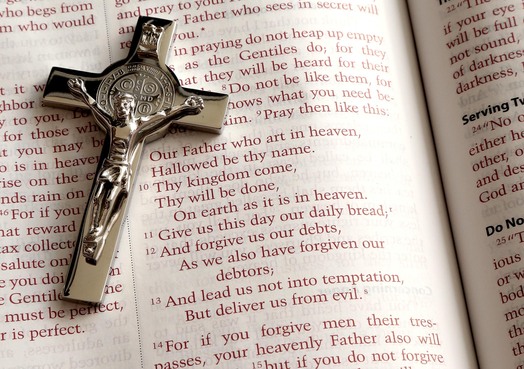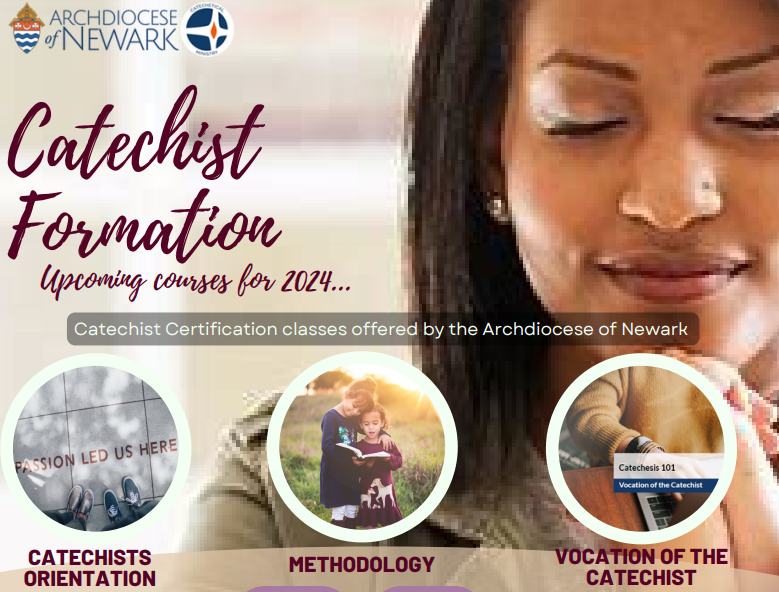Catechist Formation and Resources for Parishes
We are grateful that you have responded to God’s invitation to share your faith in an intentional way with the young people and families in your parish. The Catechetical Office of the Archdiocese of Newark is here to support you in your ministry.
In order to effectively undertake the mission entrusted to us as catechists, one must take seriously the responsibility to seek adequate formation. The Catechetical Office supports and equips catechists through our Catechist Formation and Certification Process. We provide various formation opportunities that are effective and accessible.

Catechist Formation Courses
All catechist formation courses are accessible on our online learning management system, RCAN Online. You can register for live or online courses and track your progress and certificates earned.

Catechist Formation Opportunities for 2024!
The links to register for Catechist Formation classes can be found on the flyer.

Catechist Formation
Click here for a downloadable overview of the different opportunities available for catechist formation within each of the 3 formation areas required respective to meeting each catechist where they are in their faith experience/knowledge.
Catechist Formation Process for Parish Catechists to Obtain a Full Catechist Certification
- Registration for all Archdiocesan courses and events is through the e-Learning Management System, LMS.
- It is preferable to start with the Catechist Orientation course, but all courses can be taken in any order.
- Catechists receive a certificate each time they complete a course, i.e. Vocation certificate or Spotlight on Morality certificate.
- When all three required areas of formation (Vocation, Art of Catechesis, and Doctrinal courses) are completed, the catechist has obtained a full Catechist Certification.
- Discipleship is a lifelong relationship with Christ and community. There are enrichment courses, events, and webinars continuously being added to the LMS across many topics offered to inform and support our catechists. (e.g. Catechist Convocation, The Gathering, Accompanying Those with Disabilities…)
For an overview of the different opportunities available for catechist formation within each of the 3 formation areas required respective to meeting each catechist where they are in their faith experience/knowledge, click here.
For more information regarding the Catechist Formation Process, please email Gina Butler or 973-497-4295.
WHY WE ARE CATECHISTS
This is the first dimension of catechist formation. Being a catechist is a vocation. While catechists can begin their formation by taking any course outlined in the process, it is recommended that catechists begin with the “The Vocation of the Catechist”.
Related Course: “Vocation of the Catechist”
This course will help catechists:
- Explore their call to serve in catechetical ministry.
- Learn more about what catechesis is and consider their vocation as a catechist.
- Learn to see themselves not just as a “teacher” of the faith, but also as a missionary disciple who gives witness to their faith and relationship with Jesus in word and deed.
- How to create an environment where young people and families can encounter the Lord
- How to lead others effectively to prayer
- How to creatively engage our young people in ways that are also adaptable in virtual learning environments. There will also be time for personal prayer and reflection.
“To “be” catechists! Not to “work” as catechists. Catechesis is a vocation: “Being a catechist”, is the vocation. Not “working” as a catechist.”
~ Pope Francis, Congress on Catechesis.
How: Art of Catechesis
In order to be an effective catechist, one must know how to communicate the Gospel to the young people, adults and families that have been entrusted to our care. This demands that catechists have an understanding of the factors that impact effective transmission of the message. Methodology-type courses such as, Art of Catechesis, are aimed at equipping catechists with the skills and techniques necessary for the mission.
The course, Art of Catechesis, will help catechists:
- To successfully reach the young people they serve.
- To learn how to teach as Jesus taught.
- To explore how children learn and develop spiritually.
- To learn about generational cohorts Generation Z and Generation Alpha and explore creative strategies to reach these generations.
- To develop engaging plans for catechetical sessions
- To expand their use of media and digital tools in order to adapt to an ever-changing catechetical landscape.
- To adapt of these methods in order to meet the needs of different kinds of learners.
“The catechist will be able not only to communicate the Gospel accurately, but also able to make those being taught capable of receiving it actively…”
~ General Directory for Catechesis, 112
WHAT-DOCTRINAL
Courses:
Spotlight – Morality:
Unfolds the fullness of God’s law revealed through Christ. Founded in God’s roadmap for happiness, this Pillar covers the elements of moral decision-making.
Spotlight – Faith:
Takes the learner on a journey from the beginning of God’s loving creation of mankind to the Church’s divine understandings of the End Times.
Spotlight – Liturgy & Sacraments:
This course offers an overview of the Seven Sacraments as rooted in salvation history and the coming of Christ.
Spotlight – Prayer and Spirituality:
Prayer and Spirituality is friendship with God, and this Pillar navigates us through the joys and difficulties of the spiritual life.
Spotlight Scripture (Old & New Testament):
This series on Sacred Scripture will give you an overview and introduction to this intriguing book; a book that has not only changed the world but is also given a divine role to play in each of our lives.
“This synthesis of faith should be such as to help the catechist to mature in his own faith and enable him/her to offer an explanation for the present hope in this time of mission.”
~ General Directory for Catechesis, 241
ONGOING FORMATION
We are always growing in faith and skills. As catechists, we have an obligation to provide the best catechesis to the young people and families entrusted to our care. Therefore, once initial formation has been completed catechists and teachers should attend at least one event or course for continuing formation each year.
Ongoing formation for catechists helps them:
- Harmonize the human, spiritual, doctrinal, and pastoral dimensions of their apostolate.
- Keep abreast of the life of the Church – its needs, new documents, as well as changing social, cultural, ethnic, and religious circumstances.
- Overcome discouragement and burnout.
~ National Directory for Catechesis, 55
LMS offers a number of Ongoing Formation courses, which can be accessed here. Also, check out our calendar for other events offered by the Catechetical Office.
FAQs
Formation is a process by which we grow in the knowledge and skills necessary to be effective catechists.
Catechist formation is necessary because we desire to serve the young people entrusted to our care to the best of our ability. Investing in this process equips you for the mission and will help you grow in your own relationship with God.
Catechists in the Archdiocese of Newark are expected to seek BASIC Catechist Certification and ongoing formation. There are three areas of certification that must be completed in order to achieve Basic Certification: 1) Vocation of the Catechist, 2) Methodology and 3) Doctrinal When all three areas of formation (Vocation, Methodology and Doctrinal) are completed, the catechist has completed this initial formation process. (Click here for a detailed explanation and course offerings in each area.)
The Archdiocese of Newark offers live courses throughout the year at various locations throughout the Archdiocese. Access our online learning site for a list of live workshop dates and registration. We also partner with the University of Dayton and online courses are offered through their website. For additional online options and local parish opportunities contact your Parish Catechetical Leader / Director of Religious Education.
Catechists are encouraged to begin with the “Vocation of the Catechist” course. However, in order to help you achieve your basic certification in the most efficient way possible, you may take courses in any order as your personal schedule permits.
Everyone works at his/her own pace. Catechists should aim to have taken the “Vocation of the Catechist” and “Methodology” within the first two years of their ministry as a catechist. On average, Basic Certification can take between and 4 years to complete.
Courses from any track may be used to fulfill requirements. You can mix and match the type of courses that you take according to your personal preferences and the your availability. (e.g. You may take the a live course for the “Vocation of the Catechist” and then take courses for other areas online.)
Catechists are encouraged to keep track of their progress and to keep copies of all certificates obtained. You can also CLICK HERE for a printable check list to help you keep track of your courses.
Certificates for the live courses are typically presented the day of the course. Online course certificates are sent by mail. Catechists receive a certificate each time they complete a course in a specific area. When a catechist completes all the courses required for all 3 areas of certification (e.g. Vocation certificate, Methodology certificate and Doctrinal certificate) he/she receives a certificate for Basic Catechist Certification. This final certificate is typically sent to the local parish and is presented there by the parish catechetical leader.
We are always growing in faith and skills. As catechists, we have an obligation to provide the best catechesis the young people and families entrusted to our care. Therefore, once initial formation catechists should take at minimum of 3 hours of continuing formation. CLICK HERE to see the many different continuing formation opportunities offered by the Archdiocese of Newark (e.g. Catechist Convocation, Bible/Men’s/Women’s conferences, online course work, etc.) Contact your parish catechetical leader or DRE for opportunities at your local parish.
Contact
the missionary mandate of the Lord (Mt 19-20) and is aimed, as it’s very name indicates,
at making the proclamation of the passion,
death and resurrection continually resound
in the heart of every person,
so that his life may be transformed.
